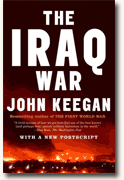John Keegan
book reviews:
· general fiction
· chick lit/romance
· sci-fi/fantasy
· graphic novels
· nonfiction
· audio books
· author interviews
· children's books @
curledupkids.com
· DVD reviews @
curledupdvd.com
newsletter
win books
buy online
links
home
for authors
& publishers
for reviewers

 |
The Iraq War: The Military Offensive, from Victory in 21 Days to the Insurgent Aftermath John Keegan Vintage Paperback 304 pages May 2005 |
|
Like all books written too soon after the events, John Keeganís The Iraq War: The Military Offensive, from Victory in 21 Days to the Insurgent Aftermath is full of facts, but the interpretation of those facts is personal and biased. Itís not his fault. Heís human. On top of that, context is very hard to appreciate when events swirl around you.
Keegan is the Defense Editor of the Daily Telegraph and lives in England, giving him a decidedly British point of view. It also ends with Bushís declaration of end of combat in May 2003, when the total number of American fatalities was 122 and British was 33. At that point, accidents and friendly fire caused many of these deaths. There was a sense of triumph since the overthrow of Saddam Hussein furthered longstanding Western goals. The book begins with the history of Iraq and the rise of Saddam Hussein. This background information was heavy on Western interpretation of Middle Eastern politics. Given that Britainís long association with Arab society is marred with culture clashes and religious misunderstandings, itís wise for the reader to keep in mind that there are alternative perspectives. There are many truths associated with each fact. Given distance and disinterest, American understanding of this region is even more limited. Race, religion, tribal loyalties/hatreds and oil complicate Iraqi politics. Split into three main populations -- Sunnis, Shiites and Kurds -- the country has long struggled to balance their competing needs and demands. Although brutal and uncouth, Saddam Hussein is a product of his surroundings, and like his idol, Hitler, he did have some successes during his tenure. He also had some monumental failures. His contentious relationship with his neighbors was not simple aggression but something far more complex and integral to Arab society. The traditional animosities between the Iranian (Persian) Shiites and the Arab Sunnis made Saddam a curious mix of avenging warrior and rowdy assassin to his Arab supporters during the 1980s -- especially the Kuwaitis and the Saudis. His harsh dealings with the rebellious Kurds pleased many of these countries who also had sizeable Kurdish populations longing for their own homeland. It was only when a squabble over whether or not Saddam owed Kuwait and Saudi Arabia for monies transferred to him in support of his invasion of Iran that the fragile links fell apart and older resentments resurfaced. Falling back on aggression as the technique of choice when trying to resolve differences, Iraq invaded Kuwait and began the victorís traditional raping and looting. Western concerns about access to oil prompted the formation of an international coalition to chase Saddam back inside his own borders. Furious that an Arab fight brought in outsiders, Saddam tried to break up the coalition by striking Israel hoping that they would strike back. In the end, he was crushed. The human and financial cost to Iraq was tremendous. The last five chapters of this book are dedicated to the second Iraqi War. The causes of this one were far less clear-cut, and the international coalition was significantly smaller. Iraqi intransigence and Western bellicosity made war the only language both sides understood. The tragedy of the 9/11 attacks aroused American need to punish someone -- and it was a popular suspicion that Iraq was involved in the plot somehow. Saddam Hussein couldnít or wouldnít prove that he no longer was a threat. In fact, the powerful might of United States and British forces had little trouble destroying what was left of Iraqi defenses. There were no SCUDs this time, no gas attacks, no biological warfare. Defenders simply melted away. The Iraqis tried to ignore the invaders as best they could -- a strange response to what had been billed as a "liberation". Keegan covers the buildup to war, the role of the Americans in actual battle, the role of the British, the fall of Baghdad and the aftermath -- or at least part of it. There is a sense of excitement as the world debated whether Saddam was truly a threat, was actively developing WMDs, or was connected to the 9/11 catastrophe in some way. Then there is the feeling of grim determination once the decision was made. Then the traditional fog of war. Then the search for justification which seemed to slip away once the deed was done. Time will integrate the events of the first few years of the twenty-first century. Only then will any of this make sense. © 2004 by Joyce Faulkner for Curled Up With a Good Book |
| Also by John Keegan: |
|
|
|
 Click here to learn more about this month's sponsor! |
|
| fiction · sf/f · comic books · nonfiction · audio newsletter · free book contest · buy books online review index · links · · authors & publishers reviewers |
|
| site by ELBO Computing Resources, Inc. | |
 Given that caveat, I do recommend Mr. Keeganís quick-reading tome on the tragedy of the Iraqi war of 2003. Granted exclusive interviews with Secretary of Defense Donald Rumsfeld and General Tommy Franks, the author provides us with a good understanding of their beliefs, decisions and assessments of what happened.
Given that caveat, I do recommend Mr. Keeganís quick-reading tome on the tragedy of the Iraqi war of 2003. Granted exclusive interviews with Secretary of Defense Donald Rumsfeld and General Tommy Franks, the author provides us with a good understanding of their beliefs, decisions and assessments of what happened.